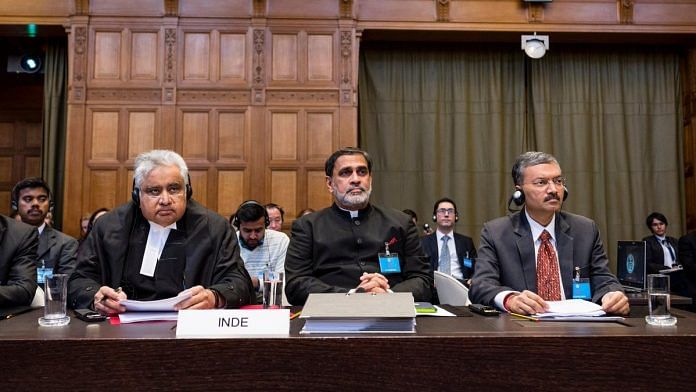New Delhi: The International Court of Justice on Wednesday ruled that Pakistan must review the death sentence for Indian national Kulbhushan Jadhav, who has been sentenced to death by a Pakistani military court. The court said that Pakistan had had breached Vienna Convention on Consular Relations by not informing Kulbhushan Jadhav of his rights for consular access, and has now directed that Jadhav be given counsular access.
Read the full verdict here:
Key operating part of #KulbhushanJadhav verdict @ThePrintIndia pic.twitter.com/ydvkvgjvo0
— Snehesh Alex Philip (@sneheshphilip) July 17, 2019
Also read: Final ICJ verdict on Kulbhushan Jadhav today, here’s a timeline of events since his arrest




To summarise ICJ’s verdict regarding India’s plea that the decision of the Military court of Pakistan be annulled and Jadhav be set free, the ICJ has avoided to interfere in the Pakistan’s judicial system. India has contended by referring to a judgment rendered by the Pakistan Supreme Court in 2016 in Said Zaman Khan et al. v. Federation of Pakistan (see paragraph 141 below), that the remit of judicial review in Pakistan is narrow, because convictions by the military courts “can only be assailed on the ground of coram non judice, absence of jurisdiction, mala fide and malice in law”. Pakistan maintains that the appropriate remedy in this case would be, at most, effective review and reconsideration of the conviction and sentence of the accused, taking into account the potential effects of any violation of Article 36 of the Vienna Convention. It refers to the decision rendered by the Peshawar High Court in 2018, which set aside more than 70 convictions and sentences handed down by military courts. The Government of Pakistan has appealed the decision and the case was still pending at the close of the oral proceedings in the present case.
This being the present scenario and considering the limited powers available to the International Judical system, direct intervention into a countries judicial proceeding could be too farfetched. The most ICJ could do is as per following observations : “In light of these circumstances, the Court considers it imperative to re-emphasize that the review and reconsideration of the conviction and sentence of Mr. Jadhav must be effective. The Court notes that the obligation to provide effective review and reconsideration can be carried out in various ways. The choice of means is left to Pakistan. Nevertheless, freedom in the choice of means is not without qualification. The obligation to provide effective review and reconsideration is “an obligation of result” which “must be performed unconditionally. Consequently, Pakistan shall take all measures to provide for effective review and reconsideration, including, if necessary, by enacting appropriate legislation.”
This is hardly a vindication of the fairness of Pakistan’s judicial system. Pakistan is claiming victory as India’s request for annulment of its Military court’s verdict has not been upheld. But the above verdict clearly describes ICJ’s reservations about fairness and independence of the Pakistani judicial system.